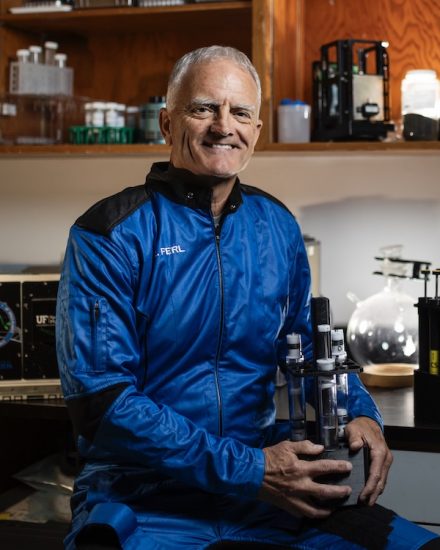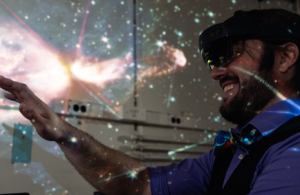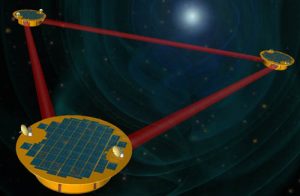- About
- Research Lifecycle
- Find Funding
- Develop & Submit Proposal
- Negotiate Agreement
- Set Up Award
- Manage Award
- UFIRST – Award Modifications
- Award Terms & Conditions
- Standard NSF Award Terms & Conditions
- Standard NIH Award Terms & Conditions
- NIH Data Management and Sharing
- NASA China Restrictions
- Fiscal Management
- Personnel Management
- Effort Reporting & Management
- Progress Reports
- Sponsored Projects Reporting
- Award Closeout
- Federal Agency Grant & Contract Websites
- Frequently Asked Questions
- Close Award
- Research Integrity & Compliance
- Resources
- News & Features
- UF Innovate

The UF Space Institute is where scientists and scholars from across the university collaborate on a wide variety of space-related research, from engineering, the life sciences and medicine, to the humanities and social sciences. With funding from UF President Ben Sasse and UF Research, the institute is supporting interdisciplinary seed projects, recruiting world-class leaders in space science and technology, and promoting its capabilities in space mission innovation. The institute is working to enhance existing relationships with Space Florida and the Space Life Sciences Laboratory at the Kennedy Space Center and to leverage UF’s proximity to the growing commercial space ecosystem in Florida.
Recent News

University of Florida Scientist to Fly on Blue Origin Suborbital Mission
University of Florida Distinguished Professor Rob Ferl will be the first NASA-funded academic researcher to conduct an experiment as part of a commercial space crew on an upcoming mission of Blue Origin’s New Shepard rocket.
Ferl, who is also director of UF’s new space institute, has spent his career studying how biology responds to spaceflight, progressing from experiments in his Gainesville lab to parabolic flight tests to projects on the space shuttle and the International Space Station. Read More
Funding Opportunities
Virtual Space Biosciences Training Course: STAR (Spaceflight Technologies, Application, and Research) Call for Applications
Virtual Space Biosciences Training Course: STAR (Spaceflight Technologies, Application, and Research) Call for Applications
STAR is space biosciences training for researchers interested in fundamental space biology and
spaceflight-relevant research paradigms. It was implemented for the first time as a virtual pilot
training in 2020-2021 and has continued annually since.
NASA has two major programs focused on life sciences in space. The Science Mission
Directorate is home to the Biological and Physical Sciences (BPS) Division’s Space Biology
(SB) Program and the Space Operations Mission Directorate (SOMD) oversees the Human
Research Program (HRP). These two programs represent the fundamental and applied aspects of
the field of biology, respectively, and are described below. The STAR course covers both
fundamental and applied space biology, as well as practical aspects of preparing for, conducting
and analyzing the results of spaceflight experiments. This call solicits applications for the fifth
(2024 – 2025) virtual cohort. More information
Dates:
| Apr 05, 2024 | ||
| Jun 28, 2024 | ||
| Jun 28, 2024 |
Technology Advancement and Applied Research Leveraging the ISS National Lab
RELEASE: May 2024
CONCEPT SUMMARY SUBMISSION PERIOD: May – June 2024
FULL PROPOSALS DUE: October 2024
PROJECT SELECTION: December 2024
NASA Solicits Space Technology Proposals from Early Career Faculty at U.S. Universities
The Appendix seeks proposals from accredited U.S. universities on behalf of outstanding early-career faculty members who are beginning independent research careers. The grants will sponsor research in specific high-priority areas of interest to America’s space program. ECF is intended to accelerate the development of groundbreaking, high-risk/high-payoff space technologies to support future space science and exploration needs of NASA, other government agencies, and the commercial space sector. Grants will be funded up to $250,000 each per year, with a maximum duration of three years.
- Transformational Advanced Energetic Propulsion
- Power Systems to Enable Small System Operations in Permanently Shadowed Lunar Regions
Proposals are being solicited via a two-step process where preliminary proposals are mandatory and only those invited may submit a full proposal. Mandatory preliminary proposals are due on or before July 15, 2024, and the target deadline for invited full proposals is October 24, 2024.
Technology in Space Prize (funded by Boeing and CASIS in partnership with MassChallenge)
RELEASE: July 2024
CONCEPT SUMMARY SUBMISSION PERIOD: July – August 2024
FULL PROPOSALS DUE: October 2024
PROJECT SELECTION: December 2024
UNITED STATES MILITARY ACADEMY Broad Agency Announcement
The USMA BAA seeks proposals from institutions of higher education, nonprofit organizations, state and local governments, foreign organizations, foreign public entities, and for-profit organizations (i.e., large and small businesses) for research based on the following campaigns: Socio-Cultural; Information Technology; Ballistics, Weapons, and Protections; Energy and Sustainability; Materials, Measurements, and Facilities; Unmanned Systems and Space; Human Support Systems; and Artificial Intelligence, Machine Learning, and Quantum Technologies.
Proposals are sought for cutting-edge innovative research that could produce discoveries with a significant impact to enable new and improved Army technologies and related operational capabilities and related technologies. The specific research areas and topics of interest described in this document should be viewed as suggestive, rather than limiting.
Closing Date for Applications: March 2025
Upcoming Events
- June 10th-14th The Astrobiology Graduate Conference 2024
New NASA Postdoctoral Program Fellowship Program
The NASA Postdoctoral Program is seeking early career and senior scientists to explore fellowship opportunities to develop advancements in science, technology, aeronautics, and space exploration. The deadline to apply for this cycle of fellowships is July 1, 2024. More information on the opportunities can be found at NASA Postdoctoral Fellowships | NASA Postdoctoral Program (orau.org). To apply, visit Information for Applicants | NASA Postdoctoral Program (orau.org).
Florida's Space Future
by 2030
Contact Us
Space News
Making advances in space engineering
UF engineers collaborate to develop the next generation of space exploration.
Laser Interferometer Space Antenna Mission
UF’s Herbert Wertheim College of Engineering, in partnership with NASA, is making a significant contribution to the groundbreaking endeavor.
Pushing the boundary on ultralow frequency gravitational waves
Team of physicists develops method to detect gravity waves with such low frequencies that could help unlock secrets behind the early phases of mergers between supermassive black holes.




